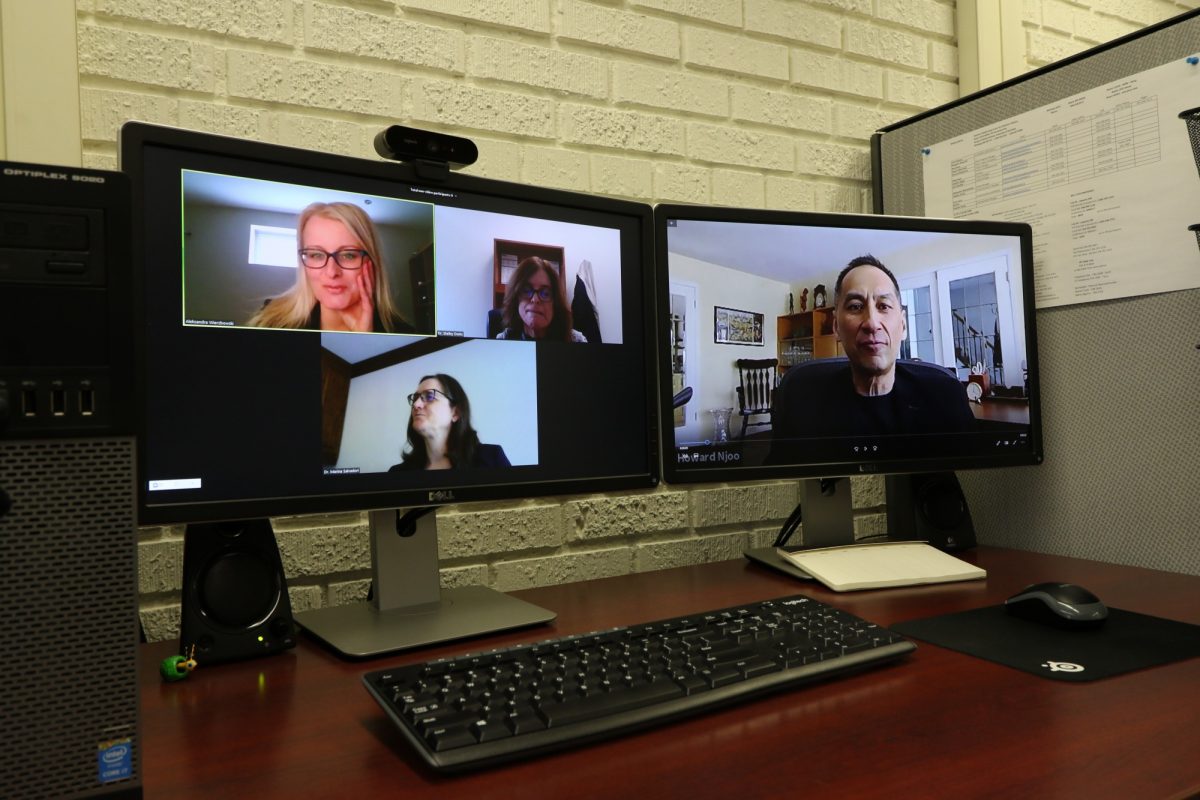
(Left screen: clockwise from top left): Dr. Aleksandra Wierzbowski, National Collaborating Centre for Infectious Diseases, Dr. Shelley Deeks, vice-chair of the National Advisory Committee on Immunization, Dr. Marina Salvadori, Public Health Agency of Canada. (Right screen) Dr. Howard Njoo, Canada’s deputy chief public health officer. They recently took part in a COVID-19 vaccine foundational webinar.
NCCID important COVID-19 resource for public health
When word of a new coronavirus spread around the world in early 2020, the National Collaborating Centre for Infectious Diseases (NCCID) at the University of Manitoba took action.
During the first two weeks of January 2020, the NCCID was receiving information about the spread of COVID-19 in China, Italy and Iran. The organization, which provides knowledge translation and reliable information about infectious diseases to people working on the front lines of public health, quickly created a disease debrief that summarized what was then known about COVID-19.
“I think we demonstrated that in the early days of the pandemic we were quite nimble and responsive,” said Margaret Haworth-Brockman, senior program manager of NCCID. “As the information began to flow in from so many sectors we were able to keep an eye on that and continue to support our colleagues.”
The NCCID, which is funded by the Public Health Agency of Canada (PHAC) and hosted by the University of Manitoba, built on that base and provided information related to COVID-19 throughout 2020 in several ways. The centre produced podcasts, webinars and provided public health practitioners with information online.
Infectious Questions, the NCCID’s podcast, produced 20 shows last year about the COVID-19 pandemic. Episodes covered everything from COVID-19 and racism to substance use during the pandemic to COVID-19 and migrant agricultural workers. For its work, the podcast was named to MPHonline’s Top 30 Best Public Health Podcasts for 2020.
“Some people can be overwhelmed by the amount of information there is out there about COVID-19 or they cannot attend a full webinar so the podcasts provide a quick explanation on important questions for public health,” said Dr. Yoav Keynan, scientific director of NCCID, and associate professor in the Max Rady College of Medicine. “We bring in an expert to answer a question and summarize the topic in seven to ten minutes so people can listen to it while you’re exercising or on their way to work.”
The NCCID works with PHAC’s team of mathematical modelers who are trying to help public health see patterns and the impact of interventions on COVID-19 spread. The NCCID developed plain language summaries of those mathematical models and distributed the information on its website, social media, webinars and through public health networks throughout Canada.
The NCCID also worked with PHAC to rollout vaccine information across the country. In a series of webinars the NCCID relayed information about the new vaccines, allergic reactions, proper handling and distribution. These webinars are ongoing in 2021.
“We have developed a very close working relationship with the Public Health Agency of Canada immunization centre to support their webinars and other information about the new vaccines,” Haworth-Brockman said.
During the unprecedented year, the NCCID welcomed 12 students. The undergraduate and graduate students received exposure to the public health functions in Canada and had a window into knowledge translation through events, creating plain language materials and recording podcasts.
While the NCCID shifted its focus to address COVID-19, it continued to concentrate on other infectious diseases. Projects include a four-part podcast series following an outbreak of tuberculosis in a Northern First Nations community, and thousands of people joined its annual seasonal influenza recommendations webinar.
“We are still committed to our work on tuberculosis, antimicrobial resistance and sexually transmitted infections,” Keynan said. “Our main angle of work is to advocate for equity considerations in the public health responses so the public health response to COVID doesn’t leave the other infectious diseases unaddressed.”






